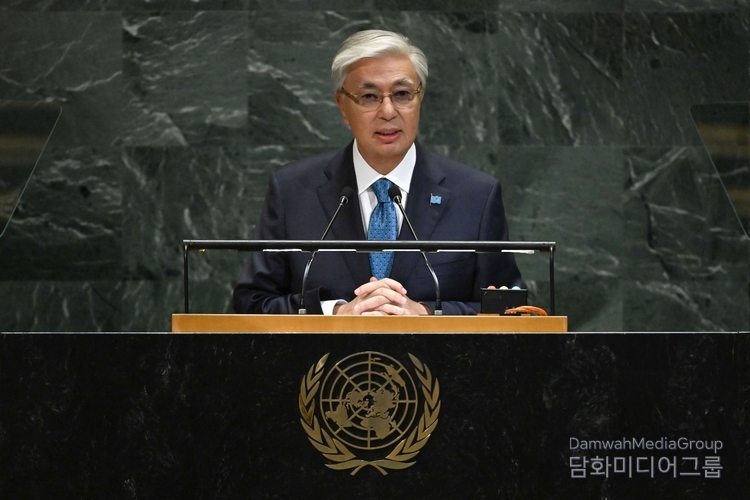By Diplomacy Journal Lee Kap-soo
Kazakhstan’s President Kassym-Jomart Tokayev called for comprehensive UN reform, stronger global cooperation, and urgent steps toward peace, sustainability, and digital equity in a time of mounting instability during the Sept. 23 General Debate of the 80th session of the UN General Assembly in New York.
In his statement, President Tokayev underscored the urgent need for a comprehensive reform of the UN system. Reflecting on the institution’s eight-decade legacy, Tokayev acknowledged the UN’s central role in addressing global challenges – but warned that the current crisis of trust in multilateral institutions must not be ignored.

“We must also face the truth: the world around us has changed profoundly – and, unfortunately, not for the better,” the President said, calling for the UN to become more “adjustable to the realities of today’s unpredictable world.”
Tokayev emphasized that UN reform is not a matter for “endless contemplations” but a “strategic necessity.” A central pillar of this bold effort, he argued, should be reform of the UN Security Council. President Tokayev called for greater representation of major powers from Asia, Africa, and Latin America on a rotational basis, as well as an amplified role for responsible Middle Powers.
“They can act as bridges within the UN when major powers are divided,” he said.
Tokayev also proposed the creation of a dedicated team to present concrete reform ideas, stressing the need to uphold the founding principles of the UN Charter, including sovereignty, territorial integrity, and peaceful dispute resolution, without selective application.
Kazakhstan’s central role in Eurasian connectivity was another key theme. President Tokayev showcased Kazakhstan’s transformation into a major logistics hub, handling 80% of overland transit between Asia and Europe.
“By 2029, we plan to build 5,000 kilometers of new railway lines,” he said.
He stressed Kazakhstan’s commitment to open markets and foreign direct investment, noting the country has attracted over $400 billion in the three decades since independence.
This year, economic growth is expected to exceed 6%, underscoring the sustainability of our economy as the largest our part of the world.
Kazakhstan is also facing environmental pressures, including the Aral Sea tragedy, the rapid melting of glaciers and the shrinking Caspian Sea. Tokayev called for urgent steps to address these crises and announced that Kazakhstan will host a Regional Ecological Summit in April 2026.
On digital transformation, Tokayev highlighted Kazakhstan’s ambition to become a fully digital state within three years. With 90% of public services already digitalized and a national supercomputer in operation, the country is embracing AI to drive progress.
“Kazakhstan views artificial intelligence not as one more technological advancement, but as a major breakthrough that can be a true engine of human progress,” he said.
President Tokayev outlined Kazakhstan’s political reforms, including a single seven-year presidential term and a stronger, more transparent governance model rooted in the rule of law.
He also outlined Kazakhstan’s four-pillar energy strategy: oil and gas, coal, uranium, and critical minerals, emphasizing that renewable energy must be part of a balanced, technologically advanced energy transition.
Kazakhstan’s grain export capacity, now reaching 12 million tons, is also positioning the country as a significant agricultural power in global markets.
President Tokayev concluded with a reaffirmation of Kazakhstan’s role as a global bridge-builder and peace-maker.







